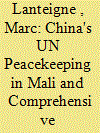| Srl | Item |
| 1 |
ID:
168172


|
|
|
|
|
| Summary/Abstract |
China's increasing participation in United Nations peacekeeping operations reached a milestone in 2013 when Beijing agreed to send a large detachment of personnel, including combat forces for the first time, to support UN peacekeeping operations in Mali after that country fell into civil war. This commitment was also distinct in that unlike other African countries where Beijing has supplied peacekeepers, Mali is not a major trading partner with China. However, this mission has both cemented Beijing's greater commitment to building African partnerships as well as demonstrating its determination to move beyond “resource diplomacy” and towards a more comprehensive approach to engaging the continent. Although China has warmed to the principles of humanitarian intervention in civil conflicts, Mali has been a critical test of China's ability to participate in UN operations in a country which is still facing ongoing violence. The Mali mission is an important step in Beijing's turn towards greater realpolitik in Chinese Beijing's peacekeeping policies in keeping with its great power status. At the same time, participation in the Mali mission has been beneficial for China, not only in helping to build the country's peacekeeping credentials in Africa but also in underscoring China's increasingly distinct views on addressing intervention in civil conflicts.
|
|
|
|
|
|
|
|
|
|
|
|
|
|
|
|
| 2 |
ID:
140028


|
|
|
|
|
| Summary/Abstract |
The global issue of humanitarian intervention has become more pronounced and complicated in recent years due to increasingly diverging views on addressing security crises between the West on one side and Russia and China on the other. Despite their support for the principles of ‘Responsibility to Protect’ (R2P), both Russia and China are wary of Western intervention in internal conflicts after the Cold War and have become increasingly critical of Western-led armed intervention in humanitarian conflicts. Unease in Beijing and Moscow over the multilateral intervention in the 2011 Libyan conflict and their ongoing opposition to Western policies in the Syrian Civil War since 2011 would seem to point to ever more coincidence in their negative views of American and Western intervention policies. A conventional wisdom has thus emerged that there is something akin to a Sino–Russian ‘bloc’, with near-identical policies of discouraging armed intervention within state borders under the aegis of humanitarian intervention or the R2P doctrine, signed in 2005 (2005 World Summit). However, closer examination of Russian and Chinese positions on the Libyan and Syrian conflicts, drawing on normative and identity perspectives, reveals significant differences in how both states address intervention in civil conflicts involving human rights emergencies. Indeed, the Libyan and Syrian cases suggest that the distance between the two states on ‘acceptable’ policies toward international intervention in civil conflicts may actually be increasing. While Russia has assumed the role of the ‘loud dissenter’ in global dialogs on humanitarian intervention, China has opted for the position of a ‘cautious partner’.
|
|
|
|
|
|
|
|
|
|
|
|
|
|
|
|